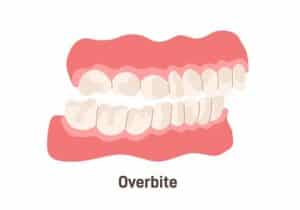If you’ve observed that your upper teeth significantly overlap your lower teeth, you may be experiencing what is known as an “overbite.” While some degree of overbite is common and often harmless, a pronounced overbite can lead to a variety of oral health issues. Upon seeking treatment, many are wondering, “Can Invisalign fix overbite?”
What is an Overbite?
In the simplest terms, an overbite is a dental condition where the upper front teeth overlap the lower front teeth when your mouth is closed. While a slight overlap is normal and even considered ideal, excessive overlap can lead to various health concerns.
Types of Overbites
Not all overbites are the same! Generally, they can be classified into two main categories:
- Skeletal Overbite: This type of overbite is due to the structure of your jawbones. Essentially, it’s the way you’re built, and it usually requires more intensive treatment, sometimes even surgical intervention.
- Dental Overbite: Unlike its skeletal counterpart, this overbite is all about teeth alignment and spacing. It’s typically easier to treat, and this is where solutions like braces and Invisalign usually come into play.
Issues Caused by an Overbite
“Why should I care?” you might ask. Well, an untreated overbite isn’t just a cosmetic issue. It can have real-world implications that affect your day-to-day life. Some of these include:
- Speech Issues: An overbite can make certain words harder to pronounce, leading to lisps or slurred speech. Trust us, it’s not something you want tagging along during important presentations or first dates!
- Digestion Problems: Believe it or not, the journey of your food starts at your mouth. Poor alignment of teeth can result in inefficient chewing, which makes it harder for your stomach to break down food. In short, an overbite might be the hidden culprit behind that indigestion.
- Oral Hygiene: An overbite can make it tricky to clean those overlapped areas, leading to plaque build-up, tooth decay, and even gum disease. Your toothbrush can only do so much if your teeth aren’t aligned properly.
Traditional Methods for Overbite Correction
Braces
What Are They?
Braces are devices made up of brackets glued to each tooth and connected by wires. They exert constant pressure on the teeth to move them into the desired position.
Advantages
- Effective for severe overbites
- Can address other alignment issues simultaneously
- Permanent results
Disadvantages
- Visible and may be considered unattractive
- May cause discomfort and mouth sores
- Require regular orthodontic visits for adjustments
Surgery
What Is It?
Orthognathic surgery involves surgical manipulation of the jaw bones to correct misalignment. It’s generally recommended for skeletal overbites and is often used in conjunction with other treatments like braces.
Advantages
- Can correct severe skeletal issues
- Long-lasting results
- May improve facial aesthetics
Disadvantages
- Invasive procedure with risks like infection and nerve damage
- Extended recovery time
- High cost, often not fully covered by insurance
In summary, traditional methods for overbite correction like braces, surgery, and retainers each come with their own set of advantages and disadvantages. While braces are highly effective, they are often visible and can cause discomfort. Surgery provides a permanent solution but comes with higher risks and costs.
Introduction to Invisalign
 What is Invisalign?
What is Invisalign?
Invisalign is a modern approach to teeth alignment that uses clear, removable aligners tailored to fit your mouth. Developed as an alternative to traditional braces, this treatment has gained significant popularity in recent years for its discreet and user-friendly design.
How Does Invisalign Work?
Invisalign treatment starts with a comprehensive dental examination, usually followed by 3D imaging of your teeth. A series of custom-made aligners are then created, each designed to make incremental adjustments to the position of your teeth. You’ll wear each aligner for approximately one to two weeks before switching to the next in the series, gradually moving your teeth into the desired position.
Advantages of Using Invisalign
- Comfort: Unlike traditional braces, Invisalign aligners are made from smooth plastic, reducing the risk of mouth irritation and discomfort.
- Aesthetics: The clear aligners are virtually invisible, allowing for a more aesthetically pleasing experience during treatment.
- Flexibility: One of the standout features is that these aligners are removable, giving you the freedom to eat, drink, and maintain oral hygiene with ease.
Can Invisalign Fix Overbite?
Yes, Invisalign can be used to correct mild to moderate overbites, especially dental overbites. However, its effectiveness may vary depending on the severity of the condition and individual circumstances.
How Effective is Invisalign for Overbite Correction?
Invisalign has proven to be quite effective for correcting dental overbites, as its technology allows for precise movement of the teeth. Many patients have successfully realigned their teeth and corrected overbites using Invisalign, often in less time than traditional braces would require.
Limitations and Exceptions
While Invisalign offers several advantages, it’s important to note that it may not be suitable for everyone. Here are some limitations:
- Severe Cases: Invisalign may not be the best option for severe skeletal overbites or complex dental issues that require intensive correction.
- Compliance: Because the aligners are removable, the effectiveness of the treatment relies heavily on patient compliance. They must be worn for at least 20-22 hours per day.
Frequently Asked Questions
Can I eat with Invisalign?
No, it’s recommended that you remove your Invisalign aligners before eating. The aligners are not designed to withstand the forces of chewing, and eating with them in could damage or warp them. However, one of the advantages of Invisalign is that the aligners are easily removable, allowing you to eat freely.
How long does the treatment take?
The duration of Invisalign treatment can vary widely depending on the complexity of your case. For minor corrections, it could take as little as six months, while more complex cases might require up to two years. Your orthodontist will be able to provide a more accurate time estimate after a thorough examination.
Does insurance cover Invisalign?
Insurance coverage for Invisalign varies depending on your plan. Some dental insurance plans may cover Invisalign treatment in the same way they cover traditional braces. It’s essential to consult with your insurance provider to understand the extent of your coverage. Additionally, many orthodontic practices offer payment plans to make the treatment more affordable.
Can Invisalign fix overbite when it’s severe?
Invisalign is generally more effective for mild to moderate overbites. Severe cases, especially those involving skeletal issues, may require more invasive treatments such as surgery or traditional braces. However, advancements in Invisalign technology are continually being made, and in some instances, it can be used in conjunction with other treatments for more effective correction. Consult your orthodontist for personalized advice.
Consult a Trusted Invisalign Orthodontist in New Jersey
Ready to transform your smile into one you’ll absolutely love? Look no further than Smiles by Lorino, your certified Invisalign provider in New Jersey. With the expertise of Dr. Robert Lorino, achieving a beautifully straight smile—without the inconvenience of traditional braces—is now easier than ever.
🌟 Special Offer: Schedule a FREE consultation with Dr. Lorino to determine if Invisalign is the right solution for you! Utilizing state-of-the-art digital impressions and personalized treatment plans, we’ll show you exactly how your teeth will look post-treatment.
Can Invisalign fix overbite? Discover how Invisalign’s breakthrough technology can you the ultimate in comfort, aesthetics, and flexibility while addressing the issue of an overbite. Say goodbye to metal braces and hello to clear, removable aligners that let you eat, drink, and maintain oral hygiene without any hassle.
Book Your Free Consultation Today!




 What is Invisalign?
What is Invisalign?